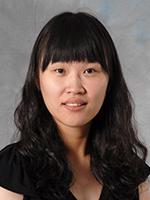Student News
Rx for Astronauts
Ph.D. Student Lei Wu Wins Award for Work on NASA Project to Improve Delivery of Intranasal Space Motion Sickness Drug
UH College of Pharmacy Pharmaceutics doctoral candidate Lei Wu's work on a project for NASA aimed at improving the bioavailability of a drug used for space motion sickness was recognized with a Student & Trainee Award at the American College of Clinical Pharmacology Annual Meeting Sept. 14-16 in Atlanta, Ga.

Wu and her fellow researchers — including UHCOP Professor and Director of the Institute for Drug Education and Research Diana S-L. Chow, Ph.D., Wu's graduate advisor; NASA Chief Pharmacologist/Technical Manager and UHCOP alumna Lakshmi Putcha, Ph.D.; and others at UHCOP, NASA and private-sector contractor Wyle Laboratories — have been working to develop a more effective, predictable drug-delivery system for spaceflight crews.
Through clinical trials and laboratory analyses, the researchers have been working to develop a pharmacokinetic model — a system to predict what the body does with the dose of a drug through absorption, distribution, metabolism and excretion — of an intranasal gel formulation of the drug scopolamine. Astronauts previously have used an orally administered form of scopolamine, but the effectiveness of oral medications typically is limited due to poor bioavailability and other factors.
Space motion sickness is commonly experienced by astronauts and often requires treatment with medications during the early flight days of space missions. With symptoms that can include nausea, vomiting, loss of appetite, headaches, cold sweats and fatigue, space motion sickness is detrimental to the need for crews to operate at peak performance during their missions.
The pharmacokinetic model will be used to predict the relationship between plasma, saliva and urinary scopolamine concentrations. With a validated model, the bioavailability of the drug can be determined by saliva and/or urine data - instead of the more invasive blood sampling - in space and other remote environments.
Wu, who will receive her Ph.D. in Pharmaceutics in December, has been working on the project for about three years as part of her doctoral dissertation. It's the second time that Wu has received the award from ACCP for her work on the project; she also earned the same award for a presentation on early results of the project in 2012. This year's award also marks the fourth consecutive year that one of Chow's doctoral students has received the recognition from ACCP.